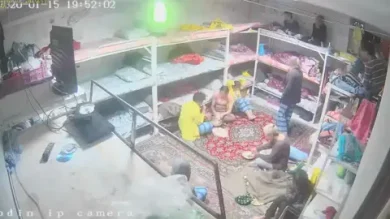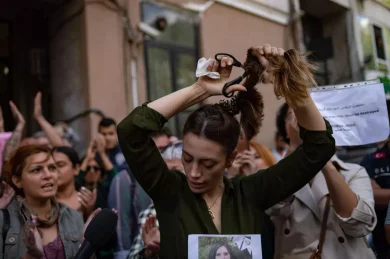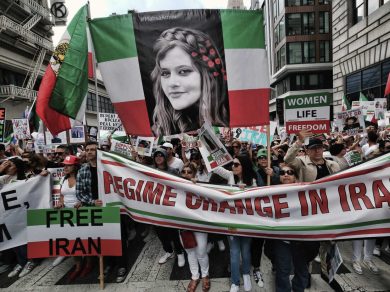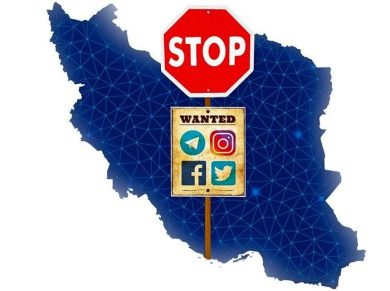The Islamic Revolutionary Guard Corps (IRGC) plays a significant role in Iran’s military operations, proxy wars, cyber warfare, and domestic repression. As a result, many countries and international bodies have taken measures to counter the IRGC’s influence through sanctions, diplomatic pressure, and efforts to promote accountability for its actions. These responses aim to weaken the IRGC’s ability to operate both within and beyond Iran’s borders. This article examines how the world has responded to the IRGC’s activities, focusing on sanctions, diplomatic efforts, and global accountability measures, as well as their effectiveness and challenges.
1. Why the IRGC Is Targeted
The IRGC is targeted by the international community due to its involvement in:
A. Regional Destabilization
• The IRGC, particularly its Quds Force, supports proxy militias and terrorist organizations in Syria, Lebanon, Iraq, Yemen, and Palestine.
• Its activities have contributed to prolonged conflicts, humanitarian crises, and weakened governance in these regions.
B. Human Rights Violations
• The IRGC is central to domestic repression in Iran, including crackdowns on protests, arrests of dissidents, and enforcement of strict social controls.
• Human rights organizations have documented cases of torture, extrajudicial killings, and surveillance carried out under the IRGC’s authority.
C. Terrorism and Cyber Threats
• The IRGC has been designated a terrorist organization by several countries, including the United States.
• The IRGC’s cyber units engage in cyberattacks on critical infrastructure and spread disinformation globally.
2. Sanctions as a Tool Against the IRGC
Sanctions are a key strategy used by the international community to limit the IRGC’s financial and operational capabilities.
A. Types of Sanctions
1. Economic Sanctions:
These restrict access to international financial systems, trade networks, and foreign assets. They target IRGC-affiliated companies and individuals.
2. Travel Bans:
Many countries prohibit IRGC officials and operatives from entering their territories.
3. Arms Embargoes:
Countries have imposed arms embargoes to prevent the IRGC from acquiring advanced military equipment.
B. Major Countries and Regions Imposing Sanctions
• United States: The U.S. has designated the IRGC as a Foreign Terrorist Organization (FTO) and imposed comprehensive sanctions on its activities.
• European Union: The EU has sanctioned several IRGC officials and entities involved in human rights abuses and terrorism.
• Canada and Australia: Both have implemented targeted sanctions on IRGC leaders and affiliated organizations.
C. Impact of Sanctions
• Sanctions have limited the IRGC’s ability to conduct international business and fund its proxy operations.
• However, the IRGC has adapted by using smuggling networks, front companies, and alternative financial systems.
3. Diplomatic Efforts to Counter the IRGC
Diplomatic initiatives seek to isolate the IRGC politically and push Iran toward greater compliance with international norms.
A. UN Resolutions
• Various United Nations Security Council resolutions have addressed Iran’s activities, particularly its involvement in regional conflicts and its nuclear program.
• While not all resolutions directly target the IRGC, they aim to limit Iran’s military capabilities, including those controlled by the IRGC.
B. Multilateral Agreements
• The Joint Comprehensive Plan of Action (JCPOA), commonly known as the Iran Nuclear Deal, sought to limit Iran’s nuclear program in exchange for sanctions relief.
• Critics argue that the IRGC continued its proxy wars and cyber operations despite the deal.
C. Regional Alliances
• Countries in the Middle East, particularly Saudi Arabia and Israel, have engaged in diplomatic partnerships to counter Iran’s influence and the IRGC’s activities.
• These alliances focus on military cooperation, intelligence-sharing, and counter-terrorism strategies.
4.Accountability for Human Rights Abuses
Efforts to hold the IRGC accountable for human rights violations have been driven by both governments and international organizations.
A. Documenting Abuses
• Human rights groups such as Amnesty International and Human Rights Watch regularly publish reports on the IRGC’s role in arrests, torture, and extrajudicial killings.
B. Legal Actions
• Some countries have initiated legal proceedings against IRGC-affiliated individuals for crimes committed abroad, including assassination plots and terrorism.
• International criminal tribunals have faced challenges in prosecuting IRGC leaders due to political obstacles and Iran’s refusal to cooperate.
C. Advocacy and Awareness Campaigns
• Global human rights campaigns, often led by Iranian diaspora communities, have raised awareness of the IRGC’s repression.
• These efforts have pressured governments to impose stricter sanctions and advocate for UN investigations into human rights abuses.
5. Challenges in Countering the IRGC
While significant measures have been taken, countering the IRGC’s influence presents various challenges.
A. Adaptation to Sanctions
• The IRGC has developed sophisticated methods to evade sanctions, including black-market trade and cryptocurrency transactions.
• Sanctions enforcement requires international cooperation to close loopholes and disrupt illicit networks.
B. Geopolitical Tensions
• Some countries prioritize diplomatic engagement with Iran to address other concerns, such as nuclear proliferation, which can limit the scope of anti-IRGC measures.
• Differences in foreign policy approaches among key players, such as the U.S. and European nations, complicate unified action.
C. Propaganda and Disinformation
• The IRGC’s control of media and its use of disinformation make it difficult to counter its narratives both inside and outside Iran.
• Strengthening independent media and fact-checking initiatives is crucial to counter these efforts.
6. Recommendations for Strengthening the Global Response
To effectively counter the IRGC’s influence, the international community should take coordinated and strategic actions.
A. Enhance Sanctions Enforcement
• Strengthen collaboration among countries to detect and disrupt the IRGC’s financial networks.
• Expand sanctions to target front companies and individuals involved in proxy wars and cyber operations.
B. Support Human Rights Initiatives
• Increase funding for human rights organizations documenting abuses by the IRGC.
• Advocate for international investigations into crimes committed during protests and military operations.
C. Strengthen Regional Alliances
• Foster cooperation among Middle Eastern countries to counter the IRGC’s proxies.
• Enhance intelligence-sharing and joint military training to address regional security threats.
Conclusion
The IRGC’s activities continue to pose significant threats to regional stability, human rights, and global security. Through a combination of sanctions, diplomatic efforts, and accountability measures, the international community can limit the IRGC’s influence and promote peace and justice in Iran and the broader Middle East. However, sustained action and multilateral cooperation are essential to achieve lasting results.
Join Our Newsletter!
Stay informed with the latest updates, news, and ways to take action in the fight for justice and global security. Sign up now to get updates delivered straight to your inbox!





